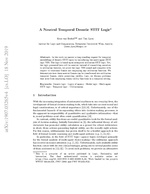A Neutral Temporal Deontic STIT Logic
From International Center for Computational Logic
Kees van Berkel, Tim Lyon
A Neutral Temporal Deontic STIT Logic
In Blackburn, Patrick and Lorini, Emiliano and Guo, Meiyun, eds., Logic, Rationality, and Interaction, volume 11813, 340-354, 2019. Springer
A Neutral Temporal Deontic STIT Logic
In Blackburn, Patrick and Lorini, Emiliano and Guo, Meiyun, eds., Logic, Rationality, and Interaction, volume 11813, 340-354, 2019. Springer
- KurzfassungAbstract
In this work we answer a long standing request for temporal embeddings of deontic STIT logics by introducing the multi-agent STIT logic TDS. The logic is based upon atemporal utilitarian STIT logic. Yet, the logic presented here will be neutral: instead of committing ourselves to utilitarian theories, we prove the logic TDS sound and complete with respect to relational frames not employing any utilitarian function. We demonstrate how these neutral frames can be transformed into utilitarian temporal frames, while preserving validity. Last, we discuss problems that arise from employing binary utility functions in a temporal setting. - Weitere Informationen unter:Further Information: Link
- Forschungsgruppe:Research Group: Computational LogicComputational Logic
@inproceedings{BL2019,
author = {Kees van Berkel and Tim Lyon},
title = {A Neutral Temporal Deontic {STIT} Logic},
editor = {Blackburn and Patrick and Lorini and Emiliano and Guo and Meiyun},
booktitle = {Logic, Rationality, and Interaction},
volume = {11813},
publisher = {Springer},
year = {2019},
pages = {340-354},
doi = {https://doi.org/10.1007/978-3-662-60292-8_25}
}
